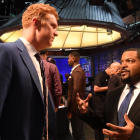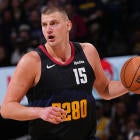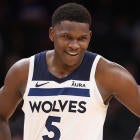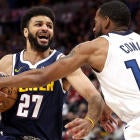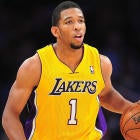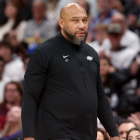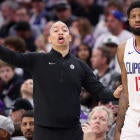Brian Scalabrine has done it all. After his 11-year NBA career, the two-time champion has spent the last six years as an analyst for NBC Sports Boston and The Vertical, an assistant coach for the Golden State Warriors, a semi-serious squash player and the captain of the Ball Hogs, one of the eight teams in the BIG3. A few days before the BIG3 season kicked off on Friday, Scalabrine spoke with CBS Sports about, well, all of it.
The following Q&A has been condensed and lightly edited.
What do you think of the label 'cult hero?'
I'm all for it. I recognize it's not like a shame to admit you're not a top player in the NBA. There's 400 guys in the world who play in the NBA. I played 11 years. I love the fact that I was on good teams. I love the fact that I was surrounded by Hall of Famers who won championships. My rolodex of people that I know, respect and talk to, I could have never imagined. Regardless of playing the last two minutes of games or whatever, my teammates and coaches always counted on me. The "Human Victory Cigar" and all that stuff, I fully embraced that the last three or four years of my career.
I didn't even mean the Human Victory Cigar stuff -- I mean the relationship you have with Boston.
I think it's really unique. I think they think I averaged like 20 points a game, the way they treat me. I ask people that all the time. I'm like, 'You guys know I averaged like two points a game, right?' And they're like, 'Yeah, yeah, we love you Scal!' It's like, all right!
What is the difference between Brian Scalabrine the human being and "Scal? the persona?
This is a good way of putting it: 2008 created "Scal." I had a blast. We won the championship. A lot of my life is dictated by that. Financially, I've benefited from being a part of that championship team, right? But my personality is more like the 2010 Brian Scalabrine. I realized that life is really precious and short and opportunities don't always come your way. The difference between accomplishing something and failing -- being a champion and not -- is such a fine line. So everything I do now is almost based upon 2010.
I kind of step out of my comfort zone and try to do a lot of different things and try to do the best job that I can at everything I do because in 2010 we were one or two possessions away from winning another championship and you let it go and you might not get that back. Scal, the "White Mamba," all that stuff was created more from '08, but me and the way I raise my family and the way I treat life and this business and being accountable to trying to call you on time is all based off of 2010.
Did that feel like an inflection point at the time?
No. Well, like, when I was flying home on the charter the next day and bawling my eyes out, not knowing if I'm ever going to play in the NBA or not -- I had no idea at that point. I think the biggest feeling of regret kind of seeps over you, right? I was like, I'll never feel that again, I guarantee you I'll never feel that again. And I don't. Now, I'm all-in on everything I do because of that. I felt that pain at that moment. I felt that regret, like I could have done more, I could have done this, I could have done that. And from that moment on, I have treated every opportunity in life as it could be Game 7, the difference between making it and not in just one moment.
You started on back-to-back Finals teams with J-Kidd. Did you appreciate how rare that was at the time, and what kind of impact did that early success have on your career?
I didn't appreciate it from a basketball standpoint, but I learned really quickly to appreciate Jason Kidd for who he is. And, like, being around guys like that -- I think [Kevin] Garnett is in that same category, guys that can change an environment just by their presence and seeing how serious they took the game and what they put into it, what they would put their bodies through to play one percent better the next day -- that sort of stuck with me.
And Jason always told me, like, you're never as good as you think you are and you're never as bad as you think you are, so if you just keep the same work ethic along the way you'll be fine. Just treat it like a job. Every day, you gotta do things you like to do and you gotta do things you don't like to do. And I think that's the reason why he became such a good outside shooter. It's because he treated his shooting like a job. He wanted to work on it every day. The world told him you can't do this, so he wanted to do it. I was just always amazed by both those guys' ability to will games, and not necessarily just using their scoring to do it.
How often do people bring up that game in Detroit in 2004?
A lot. They call it "The Brian Scalabrine Game," I heard. That is actually the name of the triple-overtime game. It's not the "Chauncey Billups, Mr. Big Shot Hit A Half-Court Shot" [Game]. It's actually called "The Brian Scalabrine Game." That's pretty cool.
What do you remember from that night?
Oh my gosh. The game has never ever moved that slow for me. I'm telling you, when I knew I was on fire, it was because of the shot I missed. The shot clock was running down and Jason Kidd threw the ball out to me and I could see -- as the ball is coming, it's coming seams up, I could almost see the NBA logo and every seam. And I looked at the clock and it said 1, and I was like, 'Wow, I gotta shoot this in the air.' So I caught the ball in the air and shot it, all in one motion -- I think we've seen Klay Thompson do it a few times -- and the ball went halfway in and popped out. And it's the only time ever in my life where I missed a shot and felt like it was my night. I was like, holy shit, I am on fire right now. After a miss.
And it's true, man. I went back and watched that -- there's a lot of shots I would have turned down because I thought a guy was in my face. I don't even remember seeing the defense! But also, with that being said, next two games, I don't even remember seeing the hoop. The defense was on me. That's the point of the playoffs -- when you do something well, if you're not a great player, they're going to take it away.
You were on four teams that went to the Finals, but you were also on that 61-win Bulls team. Derrick Rose was MVP, Tom Thibodeau was Coach of the Year. What will you always remember about that?
I remember how I really thought that Derrick Rose was going to become the best player I've ever played with. I knew at the time he wasn't better than Jason Kidd at his peak or Garnett at his peak, I just thought the trajectory of Rose -- like, with his ability to do what he was able to do with the basketball, I thought that he was going to become an all-time great. But, injuries. And I should have been a little smarter about that. Because there's something to be said in the NBA about dominating in Gear 3. Instead of 5, right? But cars have six speeds now, so it should be six.
But, how can you dominate in Gear 3? There's something to be said about LeBron and guys like that. Kevin Durant. Even Steph Curry to a certain extent. Like, I don't think he'd win the NBA MVP in Gear 3 if he was in that zone most of the time, but his ability to operate in Gear 3 -- you have to look at that as more of an ability and not necessarily as a knock. Every guy doesn't play balls to the wall. Like, Derrick Rose played balls to the wall and gave his body for it and he paid the price.
I imagine there was an adjustment period when you became a coach and an adjustment period when you became a broadcaster. Which one felt more natural?
OK, so that's a really good question. When I first got into broadcasting, I always had the itch go to back to coaching. When I got into coaching, about halfway through, I realized I was a bad coach and a bad father. I could have been a good coach and a bad father, I could have been a good father and a bad coach, but I couldn't do both. So the writing was on the wall for me. I needed to be better for my family. My kids were coming into age and my goal always was to be around for them and it's hard to be one foot in, one foot out.
And I'm sure a lot of people have this problem with their careers, pushing and driving that. But the issue is in broadcasting, I knew already I didn't have to have one foot in, one foot out. I could dictate my schedule as a broadcaster, I mean to a certain extent.
But the year with the Warriors, that was really good for me because it solidified what I want my life to look like. Like I said before, with the 2010 thing, I didn't do the one foot in, one foot out really well. But that year, I really struggled. I struggled figuring out my time and how to do something and it's just the whole dynamic of it. And I love the Warriors and I love the organization and I thought the players were fantastic. I'm like the first guy -- as soon as I got back into the business, I said, 'The Warriors are going to win a championship, Steph Curry is going to be an MVP,' because I just thought they had what it took. The reason I took the job originally is 'cause I thought they were a championship-caliber team. But I had to put all that aside because I wanted to be a good dad.
So that was a tough adjustment period. But once I went all-in on the broadcasting thing, I really have had good peace with my life. I feel good about it. I don't take my work home or any of that stuff. I can focus in on my family when I need to. It's been really refreshing the last three or four years.
Does your experience as a coach help you as a broadcaster?
Definitely. I don't know if I ever would have went all-in as a broadcaster if I was like that as a coach. I had to go through it. I had to, like, kill the dream. The dream of one day becoming a head coach in the league. I had to kill the dream and make the priority my family. Doing the coaching thing helped me understand that.
Being around the Celtics now, what's it like being on the ground floor of something that could be really special? I know you had that experience with the Warriors in a different role.
Good question. I was, just like the national media was, I was a terrible analyst for the Celtics this year because I thought that the move they made was going to kind of like make 'em take a step backwards. 'Cause I knew Jayson Tatum and Jaylen Brown were going to have to develop. But I never factored in these young guys being so good so young.
It sort of opened my mind up. I think young players are becoming better at a younger age now. I think a lot of that has to do with the individual coaching and skill. I think the game shifting makes a difference. It's not as physical of a game; that helps 'em, too. Tatum and Brown -- and Donovan Mitchell, Ben Simmons, all those guys -- have blown my mind on what young players are capable of doing in this league.
I think right in the middle of that Milwaukee series, I started thinking this team is going to win a championship next year. I don't know if they'll be better than the Warriors, but I fully expect -- it will be a disappointment if they don't make the NBA Finals. And I don't care where LeBron ends up. Even if he ends up in Philly, I just think that this Celtic team is ready to take that next step and it's going to be really cool to watch over the next X amount of years.
Whether Danny [Ainge] makes another move or doesn't make another move, the foundation and pieces are in place. There's been a lot of talk about adding a guy like Anthony Davis, now there's talk about Kawhi Leonard -- whatever move that they make has to be such a no-brainer, Hall of Famer type of player coming in. Whether they stay the same or make a move, it seems like either way the team is going to be really good for the foreseeable future.

The BIG3 is so different from an NBA schedule. You're playing once a week and it's like a traveling festival -- what was that like for you last summer?
It was interesting. All the marketing going into it before -- getting into the city, doing radio interviews, print interviews, you're sort of building it up like an event, like an All-Star Game. There's celebrities in the stands. I think the very first day, we had no idea what to expect and we go into Barclays Center and there's lines out the door and it's sold out and the games were really intense. It took me like four weeks to finally understand what was important from a basketball standpoint and how to win and then, from then on, I thought I had a good grasp.
Could you expand a little more about learning how to win in the league from a strategic perspective?
So as a captain, I had to draft the guys. I thought, let's go with positionless basketball, right? Everyone can shoot, pass, dribble; everyone could post-up … switching defensively, very much how the NBA is played now, right? You watch the NBA playoffs: no bigs on the floor, it's all about everyone can shoot. So, that was kind of my philosophy going in. But I quickly realized, in a 14-second shot clock, where you have to rebound, clear it, big men do really matter. And then on top of that, you have to have guys who can play one-on-one and also guys who can defend one-on-one. And I didn't think about that as much as other guys did, and they really took advantage of that early on.
As the season went along, last year, our guy Xavier Silas really started to come into his own and became a really good one-on-one player. So my goal this year was to draft, I thought, guys who are mentally tough and not going to get discouraged and also can defend their position on the defensive end. And then if you need to give 'em the ball, they can go get you a bucket.
For a guy like myself, which is really interesting for me, I'm drafting my best player. Most of the guys who are the captains are already their best player. So they're drafting role players. I went in trying to get the best ball-dominant guy I could, and so in this situation, I'm really happy. I got DeShawn Stevenson who I think has a ton of toughness, and Andre Owens as well. Those guys are the guys I picked up. And I feel like those guys are going to go to war for you.
Is that something you want people to know about this league -- just the fact that there's real game-planning and coaching that goes into this?
Yeah. At the beginning, I think people thought it was going to be like an exhibition. You know, like, if you go watch summer league -- like the Drew League or the Goodman League or whatever, those guys play hard for about two minutes. It's not like that. When the game's to 50, with so much on the line, guys are bringing it right from the start.
How's your squash game these days?
It has taken a backseat to my hoop game because of the BIG3, you know? But squash is a great sport because you can suck and you can get like 20-hit rallies. Like, me and you, right now could go play squash and get a 20-hit rally even if we both sucked at it.
But you don't suck at it. You've put in a lot of time playing it.
No, no, I suck enough to get beat by the No. 1 12-year-old in America. That kid kicked my ass. That was embarrassing. But that kid also didn't know who Michael Jordan was. So he's got no street cred with me.
Oh no! I didn't know that was even possible.
That's what I said! How is that possible? But he knew who won the 1919 Boston Racquet Club Squash Championship. He knew that guy. He didn't know the GOAT, though.
I guess you gotta pick your lane.
Yeah, yeah. But I'm saying, like, getting beat by that guy, I guess that's like getting beat in chess by some nerd who knows everything about chess. Even if he's only nine years old, is that really that bad? Probably not.
It's different than basketball, for sure. The height difference doesn't matter as much.
Yeah. But I don't know. Getting roasted by a 12-year-old at anything is pretty bad.













